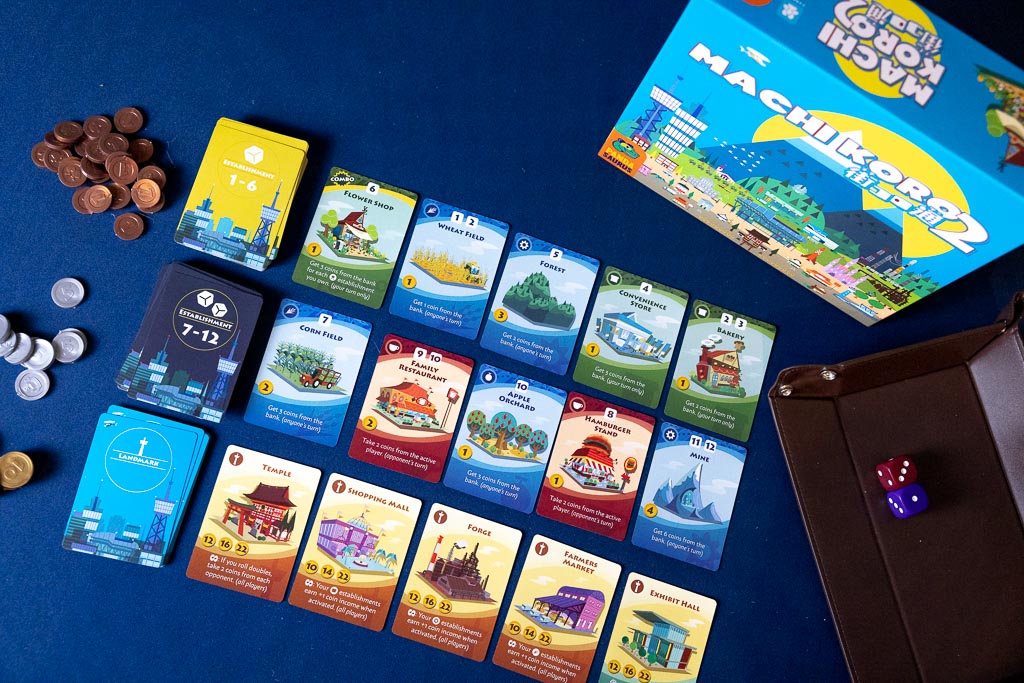By: Justice Andersen
If you’ve ever wanted to experience all the joy of commercial empire-building while not feeling any of the guilt generally associated with Monopoly, Machi Koro 2 is for you. A multiplayer game for 2-5 people, Machi Koro 2 has the players constructing a miniature business empire by buying properties off a “market” that is open to every player. The goal of this business competition is to acquire 3 “landmarks”, or buildings that cost an increasing amount as the game progresses and provide special benefits. However, the real fun part of the game is collecting heaps of dough, represented by little bronze, silver and gold tokens, whether it be from the bank or from your hapless competition in the form of rents.
In my opinion, this game strikes almost a perfect balance between strategy that feels complex enough to include variation and player choice mattering, without being so complex that it takes more than 5-10 minutes to learn. Me and my two companions set up the game and proceeded to play a round after one quick verbal read of the rules, with almost no questions asked or confusion encountered. One of the most intriguing and I believe most ingenious aspects of the game was the initial three buying rounds that the game implements, where the only actions players are allowed to engage in is a purchase each round. In the game the main way of generating money is rolling dice (similar to games like Settlers of Catan) where each of your business properties has a specified number which, when rolled, generates some amount of tokens for you. The main issue here is the idea of snowballing, that whoever goes first will always have an advantage as they will simply have more property available than everyone else if they continue buying property every turn (as well as the fact that if you have no money, you only receive 1 gold each turn). By providing each player some amount of property to start the game, I feel it helped reduce variance as all players were generating some amount of cash from the very beginning rather than the game getting off to a painfully slow start.
In addition, one of the most impactful rules in the game is that you may only build one property each turn. In our two games, this restriction really started to matter towards the end of the game when one player was very clearly ahead and allowed for some interaction with them before they simply won the game outright. There were several cards which stole half a player’s money if they had 10 or more tokens, or redistributed all players’ money evenly which this small “pause” in the action gave time to happen. One of our games was only stopped by a very timely purchase of a “Park” monument which redistributed the wealth evenly and caused one player to be just shy of being able to win and thus resulted in another player (me!) snatching the game narrowly.
Unexpectedly, the simplicity of this game is actually one of its greatest strengths. The limited nature of properties to purchase and effects which happen mean that no one strategy is a clear outlier in strength, and it is entirely the player’s choice which strategy they think will be most successful. Whether that be synchronizing property types with cards like the Winery (which allowed bonus coins for each food-property you owned) or only choosing properties which had low numbers (to take advantage of the mechanic of choosing to roll one or two dice to decide which spaces produce gold) each strategy involved enough player choice to eliminate the feeling of being scorned by the dice or random chance, at least according to the opinions of the people I played with and myself. Even though all players were pursuing the same objective, there were many unique and equally viable ways to approach it.
The only place I feel the game really struggled was the interaction between the players that allowed them to interfere with the other people’s games. Only through purchasing property that other people clearly wanted (which hurts your gameplay, and is thus discouraged) or by using one of the specific properties which allows you to interfere (which you have to purchase, and then roll which is both luck based and costs you) can you really meaningfully interact with others. I feel like these could be leaned into further, perhaps with properties which destroy other people’s properties, or levy some sort of tax on a certain variety of property to interfere with acquisition of money from it.
Altogether, this game struck a really nice balance between strategy and simple fun, which I really enjoyed getting to play, and I’d definitely recommend giving it a try!
